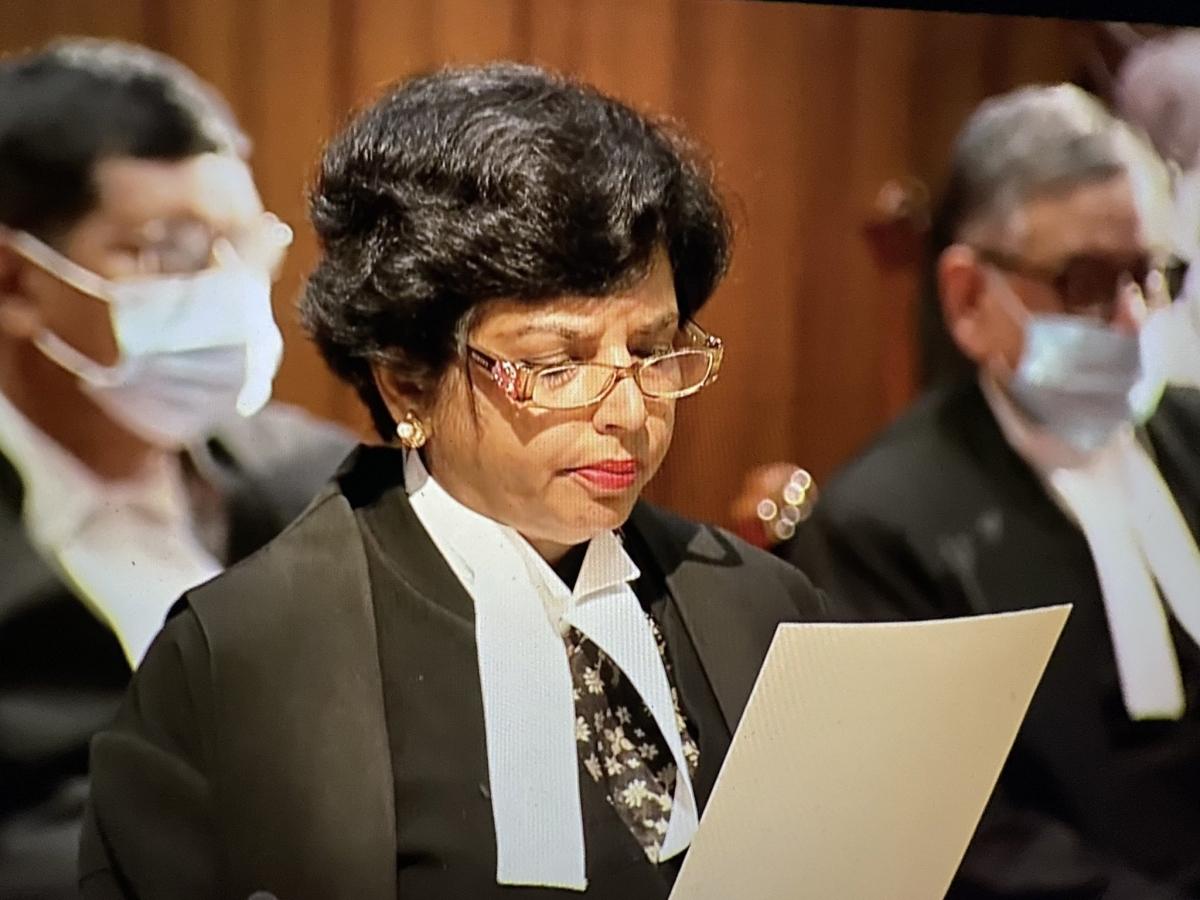“AI not a threat but an opportunity to enhance quality of legal practice”: SC Judge Hima Kohli at 1st Anniversary of "i-amicus"

Justice Hima Kohli was delivering a speech on the topic- 'Artificial Intelligence and the Legal Sector", on the 1st Anniversary of "i-amicus" organized by the ICICI Bank on February 11, at Silver Oak, Indian Habitat Centre, New Delhi.
Speaking at the 1st Anniversary of “i-amicus” organized by ICICI Bank on Saturday, Supreme Court Judge Hima Kohli said, “Artificial Intelligence (AI) should not be viewed as a threat, but as an opportunity to enhance the quality of legal practice”.
“It is undeniable that technology has played a significant role in keeping the wheels of justice turning during the peak of the COVID-19 pandemic and beyond. It has also brought to light the immense potential of technology in the field of law and justice. In those challenging times, it was imperative for courts and all the stakeholders to get tech savvy and it’s amazing how many of us, and I include myself in that list, were able to take the leap to PDF files and virtual court system. The lawyers met this challenge by logging into hearings through mobile phones, i-pads, laptops, and desktops. All this helped the courts to remain functional and continue to dispense justice to all, on time, efficiently, and equitably”, Kohli said.
The Supreme Court Judge emphasized that while adopting AI has the potential to bring significant benefits to the legal profession, however, it raises important ethical and legal concerns about the “accountability, transparency and protection of rights of parties”.
“As we embrace technology, it is imperative that we are aware of the ethical concerns that come with the use of Artificial Intelligence in courts. The use of AI raises concerns about accountability, transparency, and protection of the rights of parties. It will be critical to establishing clear guidelines and protocols to ensure that justice is dispensed equitably to all parties”, the SC Judge said at the ICICI Banks event at Indian Habitat Centre, New Delhi.
Speaking on the topic of "Artificial Intelligence and the Legal Sector," Justice Kohli stated that the use of AI in the legal field has been a "game-changer" and has the potential to revolutionize the way lawyers work. She said, “The advent of artificial intelligence has caused some concerns amongst the legal fraternity. Lawyers may fear that their expertise and skills will be made redundant by technology. However, to my mind, AI should not be viewed as a threat, but as an opportunity to enhance the quality of legal practice for the following reasons….”.
To begin with, she stated that AI has the potential to significantly improve legal practice efficiency by automating routine tasks, reducing the time required for legal research, and providing real-time access to information. This could give lawyers more time and space to focus on more complex and value-added tasks, resulting in better outcomes for clients, she said.
Secondly, AI systems can analyze massive amounts of data and identify patterns and relationships that humans may miss, which results in more accurate decision-making and better outcomes for clients and thirdly, AI can be used to provide clients with instant access to information, personalized recommendations, and virtual legal assistance, she stated. "It enhances the overall client experience and aids in the development of long-term relationships," she said.
Fourthly, she stated that incorporating AI into the legal profession has the potential to open up new business opportunities, such as the development of new legal technology products and services. "Finally, lawyers who embrace AI will be better positioned to stay ahead of their competition and relevant in a legal landscape that is becoming increasingly technologically driven, the judge said.
Stressing the 'role of Judges in an AI-Powered Judiciary', Justice Kohli said, “A judge comes on the Bench with a vast and varied legal and personal experience, whose role goes beyond the bookish application of the law. She is equipped to weigh the facts of a case, understands human behavior, and apply the law to circumstances so as to arrive at fair and just decisions. AI, however, advanced as it may be, lacks human empathy, compassion, and reasoning that is essential to the dispensation of justice.”
She added that in an AI-powered Indian Judiciary, the role of Judges is likely to change and evolve with the introduction of new technology, however, their fundamental role, in ensuring fairness, impartiality, and protection of civil liberties will remain unchanged.
“While AI has the potential to greatly improve the efficiency of the judicial system, it can never supplant human judgment. Judges will continue playing a pivotal role in ensuring that the principles of justice are upheld and that the rights of litigants are protected”, Justice Kohli said.
Kohli added that at the end of the day, AI cannot replace a trained judicial mind. Similarly, AI cannot replace the human element required of a lawyer to conduct a case or render an opinion. It is also not a substitute for a judge's wisdom and real-world experience in the decision-making process.
The Apex Court judge quoted Stephan Hawking, the famous English theoretical physicist, cosmologist, and author's lines, “Artificial Intelligence is likely to be either the best or worst thing to happen to humankind”.
The Judge concluded by saying that there are no limits to growth as there are no limits to human intelligence and imagination. “After all, it is mankind that has created AI. The bottom line is that AI can never replace the human values that are deeply ingrained in the Constitution of countries, in Institutions of Excellence in Academia, Governments, and Civil society. So, let us embrace technology and AI, but with wisdom and a steadfast commitment to the Rule of Law”, she said.
